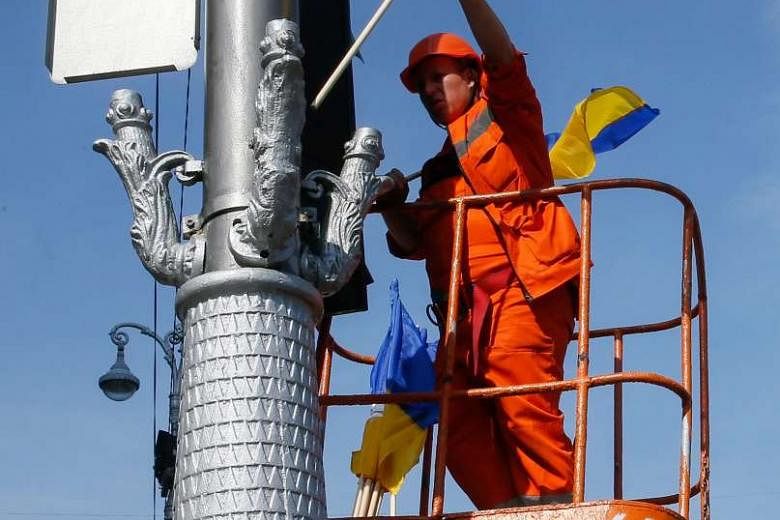The globalisation paradigm of the 1990-2000s has largely exhausted itself as a transnational economic growth driver. China, one of the biggest winners in this global trade expansion, has been structurally changing to become a more mature economy, which results in a slowdown and imminent over-investment risks. The world economy has returned to sluggish growth, both in terms of GDP and international trade.
After a series of market crises in the late 2000s, many investors worldwide have resorted to risk- management strategies, preferring lower-yielding sovereign bonds to other assets. Twenty years ago, the world was full of big country-based investment ideas, but now such stories are a rarity.
Ukraine is one such remaining investment idea. This might sound odd as for the past three years most news stories about Ukraine focused on the negative.
What does the world know about Ukraine? Little. Basic knowledge is that this country was once a key part of the Soviet Union, and is "Russia's back door".
Ten years ago, this said something about Ukraine. Today, it tells absolutely nothing.
The country has lived through a peaceful mass protest against a kleptocratic regime propped up by Moscow that ended with a massacre of more than 100 people in the centre of its capital Kiev, the occupation of Crimea and a hybrid war by Russia in parts of two other Ukrainian provinces that caused an economic crisis which cost 16 per cent of real GDP.
 A worker decorates a street in Kiev with Ukraine's national flag ahead of the country's 25th Independence Day today. PHOTO: EUROPEAN PRESSPHOTO AGENCY
A worker decorates a street in Kiev with Ukraine's national flag ahead of the country's 25th Independence Day today. PHOTO: EUROPEAN PRESSPHOTO AGENCY But one invests for the future, not for the past. What is happening in Ukraine now?
The country has managed to stop Russian aggression, and more than 90 per cent of its territory lives in peace. Visitors to Kiev never fail to be surprised by the city's beauty and low level of crime, compared with many other European capitals.
The Ukrainian leadership has started ambitious reforms to catch up with the rest of Europe - President Petro Poroshenko initiated the establishment of effective anti-corruption institutions. Fiscal, judicial and Customs reforms aimed at easing conditions of doing business are under way.
Ukraine has received significant support from the global community: the International Monetary Fund (IMF), the World Bank, the European Bank for Reconstruction and Development, the United States, the European Union, Canada, Japan, Sweden, Switzerland and others. And its economy is not in free fall any more: Real GDP is expanding, growth is observed in most sectors.
The IMF projects GDP growth of up to 1.5 per cent this year and 3 per cent in 2017.
A result of the events of the past three years is that Ukraine does not have a strong bond with Russia any more. Russia did much to destroy links between the two countries - political, business and cultural.
By charging mark-ups on natural gas, it pushed Ukraine to import this fuel from the EU. By closing its market to Ukrainian goods, it created an economic shock in the short term but realigned Ukraine's economy to the rest of the world in the longer term. Russia's share in Ukraine's exports used to be over 30 per cent, now this figure is less than 10 per cent.
And Ukrainian citizens no longer associate the future of their country with Russia. Ukrainians are overwhelmingly united in their desire to play a strong positive role in the international community. We defend our country, our right to make the European choice that the Ukrainian people want. Despite the EU's internal problems, Ukrainians remain euro-optimists - recent polls show overwhelming support for Ukraine joining the European Union.
All this suggests a solid investor story.
In the early 1990s, 11 post-communist central and eastern European states were similar to Ukraine in terms of wealth and economic development. Their accession to the EU was the result of two major factors: commitment to reforms and strong EU aspirations by their citizens. Most of these countries' economic growth and investment took place before they joined the EU in 2004. For countries like Poland, the EU vector became apparent already by the mid-1990s, when GDP was growing by 6-7 per cent every year, driven by trade with the bloc.
For Ukraine, this story is just emerging. But the Association Agreement that Ukraine and the EU signed recently is a profound road map for harmonisation with the EU. The more Ukraine goes along with implementing the agreement, the more it will follow Poland's example of the mid-1990s.
And Ukraine is an economy to look at. It is among the top three global grain exporters, top 10 steel producers and already a global IT powerhouse. While yields in its agricultural sector doubled over the last decade, it still has far to go to match international peers, meaning much room for investment.
With average wages of just US$200 (S$270) a month after the recent devaluation of the national currency, labour is particularly cheap. And numerous seaports make that opportunity available not only for European, but for Asian markets as well.
Ukrainians have thousands of years of history, yet modern Ukraine is a young nation that regained its independence only in 1991. Today is our 25th Indepen- dence Day. It has challenges - foreign and domestic - but who doesn't? Every challenge is an opportunity too.
Inspired by the success story of Singapore, Ukrainians are highly motivated to overcome existing challenges. We freed ourselves of the tentacles of history - and are building a new path for ourselves. Despite all adversities and doubt, we are moving forward, as the shining example of Singapore shows is possible.
- The writer is the Minister of Foreign Affairs of Ukraine.

